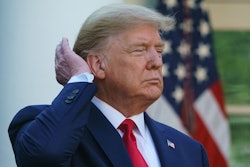With Ivy League institutions providing financial relief that may result in higher enrollment of students of color, the next president of Howard University will need to address the institution’s financial and structural impediments in order to compete for top students, Gen. Colin Powell, chair of the presidential search committee, said this week.
Powell’s comments came during a town hall meeting held this week to address students, alumni, faculty and community concerns about what they want to see in the next president.
A candidate who can address the lack of financial resources for students and faculty is imperative, said Powell. “Schools like Yale and Harvard are relieving the financial burdens for potential students, making it easier [for them to recruit students of color], and harder for us,” he added.
It will be another five months before the board of trustees announces the university’s 16th president, who will replace retiring president H. Patrick Swygert, but Powell said the board is working hard to examine the credentials of the several candidates who have applied.
Swygert announced his retirement, effective at the end of this academic year, last spring, weeks after the Faculty Senate Council called for his resignation. Howard University’s council stated that Swygert’s fiscal mismanagement has hurt the academic quality of the school. Last year, the council, which represents more than 1,000 professors, voted 16 to 2 with one abstention to send a letter to the board of trustees forcing Swygert’s resignation.
Addison Barry Rand, chairman of the university’s board of trustees, sat alongside Powell during the presidential town hall meeting held in the WHUT television studio Tuesday afternoon to address students, alumni, faculty and community concerns. The event was invitation only.
Prompted by a 20-city listening tour and hundreds of letters of concerns from the Howard University community, Rand assembled a comprehensive list of issues the new president must be equipped to tackle. Topping the list was faculty pay and infrastructure renovations and repairs.
Rand expressed to the modest audience that efforts to bring faculty pay to equilibrium with the market over the next two years, and provide the infrastructure necessary for scholarly excellence, particularly in the areas of science, technology, engineering and mathematics, were already in place.
Board members suggested that Howard University, the second largest producer of Black Ph.D.s and owner and operator of Howard University hospital, was relying too much on its rich history.
To take the institution to the next level, Rand said, “We’re looking for a world-class leader, a visionary, a change agent. One willing to make tough decisions. Someone with a passion for Howard’s historic mission but vision for the future.”
While board members are seeking an ambitious, aggressive, relentless, fundraiser who can increase Howard $482 million endowment, Howard professor Mercedes Tibbits charged board members to seek a “humanist” who is influential in the local community and an advocate for faculty needs.
The board’s attempts to extend the presidential search to the Howard University community was lauded by Dr. Leo Rouse, dean of Howard’s College of Dentistry. “I am very pleased with the board’s approach. If you send an e-mail to the presidential committee, you will get a response. That’s remarkable. Chairman Rand is very sincere in his efforts. The university must be patient in order to get the best possible candidate.”
Roberta McLeod, director of the Armour J. Blackburn University Center, said she desires a candidate who can address the financial needs of students. “Some of our students are facing severe financial hardships. There are those that leave Howard because they cannot afford it. We must raise money to keep these students,” McLeod said.
Rand announced light-heartedly that tuition was expected to increase, noting that Howard University’s current tuition of $6,607 was the lowest of comparable historically Black colleges of Howard’s stature.
Michael Browne, an undergraduate student at Howard University, emerged from the town hall meeting encouraged.
“They seem very receptive to the agenda set forth by the Howard community. I appreciate their effort to make the process appear transparent. I do wish that students had a bit more input, although I understand that the politics of the process will not allow for that,” Browne said.
–Michelle J. Nealy
There are currently 0 comments on this story.
Click here to post a comment
© Copyright 2005 by DiverseEducation.com


















